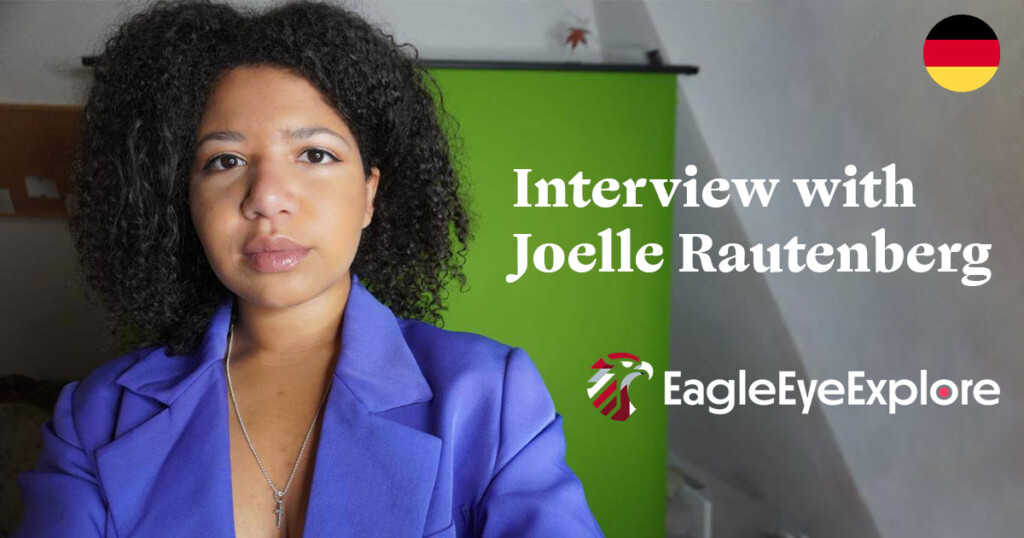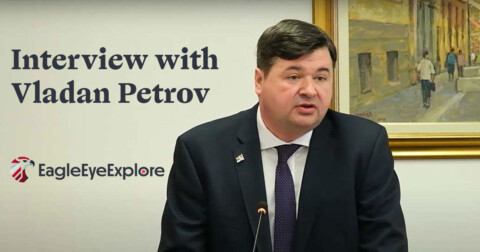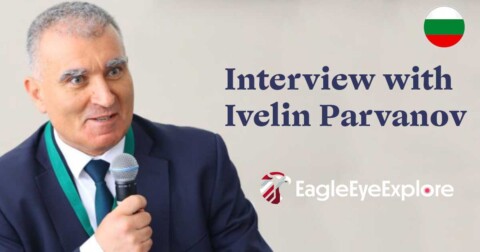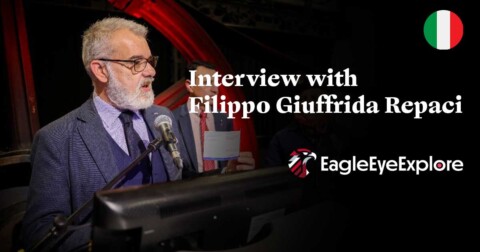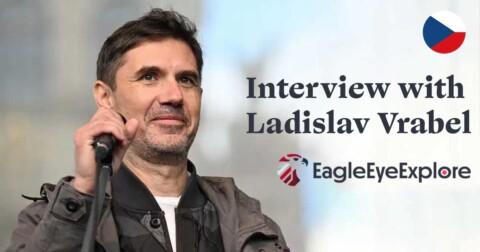Joelle Rautenberg is the editor of the portal nius.de, specializing in issues of Islamism and migration. Born and raised in Berlin, she studied economic history and cultural anthropology at the University of Göttingen. As the daughter of an imam from Ghana and a German Evangelical, last year she discovered the Catholic faith and was baptized. The portal nius.de was founded by Julian Reichelt, former editor-in-chief of Bild.
In her articles, Rautenberg critically analyzes institutional policies and media narratives in Germany, especially at the intersection of religion, migration, and public policy. Combining academic insight (economic history/cultural anthropology) with her personal biographical perspective, she addresses questions of identity, integration, and freedom of speech in the contemporary European context.
The occasion for this conversation is her latest article documenting the case of an imam who, despite maintaining ties with the organization Milli Görüş, was allowed to preach in a Catholic church during a graduation ceremony—a topic that has once again reignited debate on “interreligious dialogue,” the role of educational institutions, and the boundaries of tolerance in Germany.
In your latest article, you expose how an imam affiliated with the “Milli Görüş” organization classified as Islamist by German authorities, was allowed to preach in a Catholic church during a graduation ceremony. Do you see this case as an exception, or is it becoming the “new normal” within the German educational and cultural system?
This is not about a ‘new normal’ – it is already normal. And it is not new, but has existed ever since former Chancellor Merkel violated the Dublin III Regulation in 2015 by flooding Germany with millions of refugees, while later cynically preaching her notorious ‘We can do this’ to a deeply concerned German people. Today, we can clearly see what this ‘We can do this’ has turned Germany into. In the German education system, it has become normal to adapt to Islamic traditions. Catholic schools such as ‘Bonifatiusschule II’ in Göttingen celebrate Islamic holidays like Ramadan and even force students to visit mosques. In kindergartens, so-called ‘halal’ meals are served, and German universities set up special prayer rooms. These are euphemistically called ‘rooms of silence,’ supposedly open to all religions – but in reality, they are almost exclusively used by Muslims. Yet, Islam does not contain any obligation to pray in public. Public prayer is purely a demonstration of power – a historically typical act of conquest designed to showcase the superiority of Islam over Christian society. This is evident not only in churches like St. Heinrich and Kunigunde, but also in many other Catholic and Protestant churches across Germany. This encroaching form of conquest is being disguised under the pleasant-sounding formula of ‘interreligious dialogue’ – a dialogue that, of course, never actually takes place the other way around. Exactly this is what Michel Houellebecq described in his novel Submission.
We often see Christian values being downplayed or even sacrificed in institutions meant to uphold them. Do you believe the German educational and media establishment, under the guise of tolerance, is actually engaging in self-erasure?
Yes, they do – and this is precisely the crux of the matter. Self-denial is not something one simply stops if one wants to; in Germany, anything connected to German culture or the Christian Occident is regarded as burdensome and inappropriate. If you look at other Western or European countries such as Hungary, Turkey, or Serbia, people are proud of their culture and determined to preserve it. In Germany, it is the exact opposite. Germans associate their culture with the worst atrocities in history: mass murder of Jews, a fascist dictatorship, and so on. What many Germans fail to realize is that their culture has much more to offer than participation in devastating wars and one of the greatest genocides in history. On top of that, many people in Germany carry – culturally and historically – what Adorno once described as the ‘authoritarian character,’ with World War II being the clearest example of it. Meanwhile, German television – financed by compulsory taxes – broadcasts news and entertainment programs around the clock that reinforce this very self-erasure. German citizens are told they must be tolerant toward Islam, while at the same time public figures like the artist ‘Ikkimel’ are promoted – a feminist who often performs scantily clad songs about sex, and even sings in one track that people should remove the cross from their Instagram bio if they want to talk to her. Most Germans never question this media environment, they pay for it without complaint, and they believe the narratives that are being presented to them.
Some argue that the potential return of Donald Trump marks the decline of woke ideology. Do you believe wokeness is truly on the retreat, or has it become even more dangerous now that it operates without direct institutional power?
It is important to distinguish between wokeness and being politically left. Wokeness can occur in connection with left-wing politics, but it doesn’t necessarily have to. This means that a decline in wokeness does not automatically translate into a decline of the political left within society and its institutions. Take an example: Ilhan Omar, a Democratic politician in the United States, is not necessarily ‘woke.’ She does not primarily engage in identity politics revolving around emotional sensitivities, gender pronouns, unisex bathrooms, or vegan school lunches. Yet, she is firmly left-wing and openly pursues a transformation of society that, according to her own words, culminates in so-called ‘democratic socialism.’ She represents a corrosive ideology in which open borders and Islamic law become the norm. So, I would not say that wokeness itself has become more dangerous. In fact, wokeness is slowly fading. What is rising instead are radical left-wing ideologies that go far beyond gender and identity politics. In Germany, for instance, many lobbying groups – financed by taxpayer-funded NGOs – are pushing for the expropriation of wealthy corporations, the introduction of universal basic income, or harsher punishments for people who allegedly spread so-called ‘disinformation’ online.
In the United States, at least rhetorically, there is open confrontation with the issue of illegal immigration. Do you think Europe particularly the EU, has either the political will or structural capacity to adopt similar restrictions, or is it too ideologically constrained to even try?
Europe clearly had the structural capacity to take in millions of migrants – often violent offenders and sexual predators with prior convictions in their home countries. Practically overnight, massive asylum centers were erected across many nations, welfare and healthcare systems were flooded, and European citizens were forced to pay the bill for the needs and demands of illegal migrants. At the same time, different MENAP studies show that despite the billions in taxpayer money poured into this illegal migration, people brought in from MENAP countries will never be a net positive. Quite the opposite: they will remain a permanent financial burden on European states for their entire lives. It wouldn’t be more difficult to organize daily deportation flights for criminal and illegal migrants than it is to maintain all the costly measures already in place. The real question, however, is not about structural capacity – it is whether the political will exists. And that is an entirely different matter.

With global political shifts toward the center-right and increasing criticism of mass migration, do you believe the Islamization of Europe can still be halted or has it already progressed beyond the point of reversal?
I am an optimist. At the same time, I am a realist. When the German economist Thilo Sarrazin published his book ‘Germany Abolishes Itself’ in 2010, I was only ten years old. In it, he described the consequences of declining birth rates, a growing underclass, and immigration primarily from Muslim countries. At the time, these issues were already shaping my life – even though I was unaware of it. At my school, it was common for German students to be beaten up by groups of Turkish or, more often, Arab classmates simply because they refused to swear on the Koran or had pork in their lunchbox. My mother worked hard, and we lived frugally, yet we never had enough money for vacations or leisure activities. Meanwhile, my classmates always had the latest Nikes and fashionable sports clothes. During summer holidays, they traveled with their large families back to Turkey or various Arab countries – even though their parents often did not work. As a child, I could not make sense of this. Fifteen years ago, Sarrazin – who was canceled and expelled from his own party, the SPD, for his critical views – warned that the high birth rate of Muslims in Germany would soon lead to irreversible changes in the country. He was right. Today, Germany’s birth rate has dropped to 1,35 and in other European nations, the situation is no better. The exact birth rates of Muslim immigrants are rarely recorded, but anyone with eyes can see the demographic reality by walking through any major EU city – be it Berlin, Stockholm, or London. White Europeans are often a visible minority, while Muslim families, confidently strolling with five or six children, are strikingly more common. Western women, by contrast, are usually seen childless or, at most, with one. Exceptions exist, but they prove the rule. Mathematically, it is clear where this is headed: Muslim immigrants will soon form majorities in European countries. As the German-Palestinian SPD politician Sawsan Chebli once admitted, ‘Demography will create facts.’ We should have started deportations of criminal and illegal migrants yesterday if we wanted to regain control of the situation. From a purely mathematical standpoint, the outlook is bleak. And yet, as I said at the beginning, I remain an optimist. It will be a difficult undertaking, possible only under resolute conservative governments in Europe – governments willing to carry out large-scale deportations of illegal and criminal foreigners.
We are seeing what appears to be a reawakening of Christian or conservative identity in various spheres culture, politics, activism. Do you think a genuine Christian revival is underway in Europe, or is it just a media illusion with little real foundation?
You are asking about a ‘genuine’ Christian revival. With that qualification, I am not sure I would fully agree with the premise. I do agree that there is a form of Christian revival underway – but whether this revival is truly authentic, rooted in the values of Christianity itself, I am not certain. What I observe instead is that many people in Western countries are becoming increasingly aware of the global, migration-driven cultural changes around them. In response, they are searching for identity markers that are inherent to their own culture. From a cultural-anthropological perspective, this is a natural reaction – when a society’s established cultural practices are eroded, people seek out older traditions to re-anchor themselves. However, this emerging ‘counter-culture’ carries risks. While some genuinely turn back to traditional Western practices – including Christianity – there are also opportunists who exploit the desire for security, identity, and cultural grounding, especially among the youth. Much like the woke movement, they reduce people to identity labels such as sexuality, gender, political affiliation, or even vaccination status, and derive moral worth from these markers. Figures like Andrew Tate are examples of this. He capitalizes on real issues – such as the growing alienation between men and women, which was exacerbated by queer-feminist movements – but offers ‘simple solutions’ that are deeply contradictory. His response to declining birth rates and social fragmentation is to promote a promiscuous lifestyle in which women are treated as interchangeable objects. Such an approach ignores the very foundations of Christian values. Instead of advocating holistic solutions that strengthen Western society as a whole – for example, encouraging higher birth rates through monogamous marriages rooted in loyalty and love – he proposes short-term fixes that ultimately worsen existing problems. It follows the same flawed logic as those who romanticize Russia simply because it is not woke. They overlook the fact that Russia has no real interest in the well-being of the West or its citizens, and that Russia itself is plagued by poverty, corruption, dictatorship, and a hunger for money and power. The same applies to false prophets like Andrew Tate: they do not truly care about Christian values, but about wealth and influence.
Is true coexistence only possible when there is “mutual” respect from all sides? Because what Brussels calls “tolerance” seems increasingly to lead to frustration and social polarization, rather than harmony.
First of all, the concept of ‘mutual respect’ is problematic in itself. Yes, respect in society is good and important – but I cannot respect someone who seeks to erase my very existence. This is known as the ‘paradox of tolerance.’ Interestingly, leftists often claim that the ‘intolerant’ must not be tolerated because this would endanger democracy. Yet they apply this principle very selectively. For them, the ‘intolerant’ includes those who reject gender ideology, critical race theory, or refuse to actively participate in the so-called energy transition. But criminals, squatters, illegal migrants, and Islamists are rarely placed into that category. As someone with a migration background myself, I believe in peaceful coexistence between different cultures and people with different political views. In fact, I believe this is what makes democracy unique. But coexistence only works if newcomers are not only willing to integrate, but also to assimilate – to adapt themselves to the cultural framework of the country they have chosen to live in. If there is no interest in adaptation, and instead one’s own culture is pushed forward as the new standard, this is no longer integration – it is the pursuit of power. And any society that wishes to survive into the future will inevitably resist that. And it can do so without being “intolerant”.
Do you think that interfaith dialogue, as it is often practiced in Europe today, has become a one-way street that demands concessions only from Christians, while avoiding any criticism of Islamic or other religious norms?
Even back when I was in school, the so-called ‘interfaith dialogue’ was a major topic. I remember in 8th or 9th grade, my teacher organized an ‘interfaith week,’ where our class was supposed to visit a church, a synagogue, and a mosque. I grew up in a disadvantaged neighborhood where about 80 percent of the children at my school were Muslims. My teacher’s goal was to get students to engage with different religions and hopefully develop greater respect for others. On the day we visited the mosque, every single student attended. They listened closely to the imam, asked questions, thanked him, and behaved with almost reverent respect. On the days we visited the church and the synagogue, however, hardly any students showed up. That experience was many years ago, but it is emblematic of what ‘interfaith dialogue’ in Germany looks like today. A dialogue only exists when both sides are speaking. In Germany, however, only the Islamic side is speaking. It uses this so-called ‘dialogue’ to access taxpayer money through state-funded projects, and more importantly, to penetrate not only civil society but also state institutions, securing power and influence for itself.
What role do you believe the media should play in confronting ideological double standards especially when it comes to reporting on radical elements within minority communities?
As always, the role of the media should be clear: to report what happens, factually, without bias and without ideological agendas. The problem – especially in Germany’s state-funded media – is that this often does not happen. Take May 31, 2024, as an example. In Mannheim, an Afghan Islamist attempted to stab well-known German critic of Islam, Michael Stürzenberger, during a live stream. In the attack, a police officer was killed and five people were seriously injured. Yet in much of the media coverage, Stürzenberger himself was labeled an ‘Islam-hater’ or a ‘far-right extremist.’ The fact that an Islamist tried to murder him was often pushed into the background. This is a prime example of the blame reversal that occurs daily in Germany’s public broadcasting. And here lies the fundamental issue: media financed by compulsory fees can never truly be free or independent. Reporting honestly on ideological double standards becomes impossible when the institutions themselves are steeped in ideology.
Despite all the challenges, we’re seeing more and more young people across Europe rediscovering tradition, family values, and spirituality. Do you see this as a sign of a new beginning and a potential for a healthy cultural renewal from within?
As I said, I am an optimist. So yes, I see these developments as a potential new beginning for European society. In 2023, I was baptized Catholic. I simply felt that it was the right thing to do—that I cannot live without God’s grace and that I, like everyone else, must acknowledge that I am a sinner in order to bring lasting change into my life. I believe this is how many young people feel today. In a postmodern world where deconstructionism has become a kind of Western religion, they are searching for an antidote. They cannot identify with making gender theory or critical race theory the center of their lives, and they refuse to adopt the religion widely accepted in Germany – Islam. They seek new anchors and find them in the church or free churches, in meditation, or in improving their lifestyle—through healthy eating, for example, or by returning to time-tested concepts such as the nuclear family. These decisions rarely come out of nowhere; they are often reactions to failures caused by widely accepted postmodern Western practices. A clear example is the return to the traditional nuclear family. For years, Western societies labeled it as “unnatural,” “oppressive,” and “sexist.” Many people, inspired by books with titles like Love Differently or by activists tried to “open” their romantic relationships, as the media euphemistically reported—that is, allowing themselves to cheat on each other and be sexually available to others. Their relationships quickly crumbled; they hurt their partners, got hurt themselves, and eventually returned to monogamy, which has existed for centuries and was seen by early cultural theorists like Lewis Henry Morgan as a hallmark of civilization. Polyamory, by contrast, was associated with barbarism—a sign of being unable to control one’s impulses and focused only on immediate desires rather than long-term thinking.
The same pattern applies to other social phenomena. People—especially young people—experiment, realize it doesn’t work, and return to proven methods. As Winston Churchill is famously quoted: “If you are not a communist at twenty, you have no heart; if you are still one at forty, you have no brain
